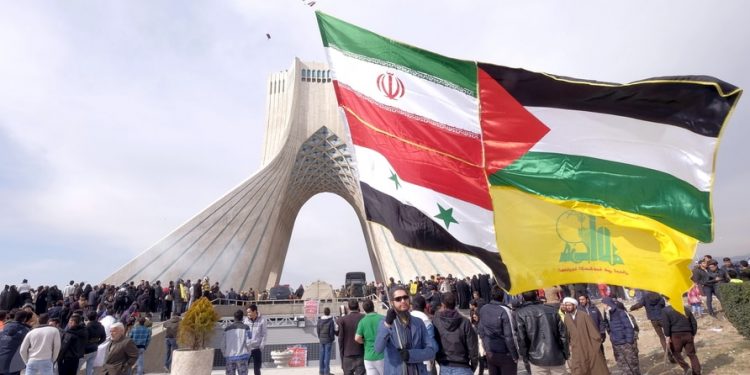WASHINGTON – Ongoing talks about restoring ties between the Syrian government and the Palestinian militant group Hamas are part of a new attempt by Iran to revitalize a regional alliance, some experts say.
Iran and its proxy militia groups in the Middle East refer to their alliance as the “Axis of Resistance.”
In a recent interview with the pro-Iranian television channel al-Mayadeen, Hassan Nasrallah, leader of the Iran-backed Lebanese Hezbollah, praised Tehran’s ongoing efforts to maintain relations with all its allies.
Nasrallah said in the interview he met the Hamas politburo chief, Ismail Haniyeh, several times during the latter’s visit to Lebanon last September. Haniyeh traveled to Lebanon to attend the Palestinian faction’s secretaries-general meeting.
Hamas is an Islamic militant group that controls the Gaza Strip. Despite its Sunni ideology, it has maintained a close relationship with Iran, a regional Shiite power.
For years, Hamas had offices in the Syrian capital, Damascus, and received support from the Syrian government, another major Iranian ally.
Ties between Hamas and the Syrian government were severed in 2012, however, following the group’s criticism of the crackdown by Damascus on anti-government protesters.
Under pressure from the government of Syrian President Bashar al-Assad, Hamas leaders left Damascus.
Nasrallah said during his recent meetings with Haniyeh that they discussed mending the ties between Damascus and Hamas. He said, “there is a very positive atmosphere” and Hamas’ “relations with the Syrian regime will be restored, but it is not easy.”
Both Hamas and Hezbollah are designated as terrorist organizations by the United States, while Syria is considered a state sponsor of terrorism by the U.S. State Department.
Normalization factor
In the wake of the recent agreements to normalize relations between Israel and several Arab countries, including the United Arab Emirates, Bahrain, Sudan and Morocco, experts say Tehran will intensify its efforts to fix broken ties in its regional alliance to face new realities in the Middle East.
“Iran considers that normalizing relations with Israel is an opportunity to reunite the ‘Axis of Resistance’ in the region,” said Emad Chidiac, a Lebanon-based analyst and journalist.
Chidiac added that with Hamas vehemently opposed to the Abraham Accords, Iran believes it can exploit the situation by bringing Hamas closer within its regional alliance.
Sponsored by the U.S., the normalization deals between Israel and the Arab countries are collectively called the Abraham Accords.
Expanding the ‘Axis’
Despite ideological and political differences, Iran and Hezbollah have managed to maintain their strategic relationship with Hamas. Some experts say their shared animosity toward Israel is what has kept their alliance intact.
“What the Iranians along with Hezbollah tried to do is compartmentalize two different conflicts [Syrian war and Israeli-Palestinian conflict], that they realized that Hamas has its own local prerogatives and its own factors to deal with, and this is something that Iran gives to its proxies,” said David Daoud, a research analyst on Hezbollah at United Against Nuclear Iran (UANI), a U.S.-based advocacy group.
Despite news reports about Russia’s plans to push Iran and its proxies out of Syria, Daoud said, Moscow has no intention of dealing with the Syrian conflict on its own.
“The Iranians and the Russians are working in tandem on reconsolidating Syria, ostensibly under Russian control, but really under Iran’s control,” he told VOA. “I think they are moving toward a phase to put the Syrian civil war behind them and put aside their differences and reunify the ranks in a broader resistance axis, which will include Hamas.”
Last week, Russian Foreign Minister Sergey Lavrov said in a press conference that Moscow will not allow Syria to be an arena for a conflict between Israel and Iran.
Lavrov’s comments came after a series of Israeli airstrikes reportedly targeted Iranian forces and weapons warehouses in eastern Syria. The strikes killed 40 Iran-backed fighters, according to the Syrian Observatory for Human Rights.
Hamas’ reluctance
Despite ongoing efforts by Iran and Hezbollah to restore relations with the Syrian government, some experts contend Hamas could lose significant support locally if it were to opt for a full restoration of relations with Damascus.
This, analysts say, is because thousands of Palestinian refugees remain in the custody of the Syrian government and areas where Hamas is concentrated intensely felt the impact of government attacks in the early years of the war.
“It is a very difficult decision to make, especially when there are many Palestinians displaced and imprisoned by the Syrian regime,” analyst Chidiac said, underscoring that under such circumstances the “Palestinians will not accept a restoration of relations with the Syrian regime.”
The Action Group for the Palestinians of Syria, a Britain-based watchdog, has documented 1,780 Palestinians in Syrian prisons since 2011. The group says the 560,000 Palestinian refugees in Syria are not able to secure their daily basic needs, noting the war in Syria has displaced 270,000 Palestinian refugees from their homes.
The Yarmouk Camp, the largest Palestinian refugee community in Syria, remained besieged by Syrian government forces for five years after it was captured by rebel groups.
The siege ended in 2018 and the remaining Palestinians were displaced to northern Syria. The camp was home to about 160,000 Palestinian refugees, according to the United Nations Relief and Works Agency for Palestinian refugees (UNRWA).
VOA






